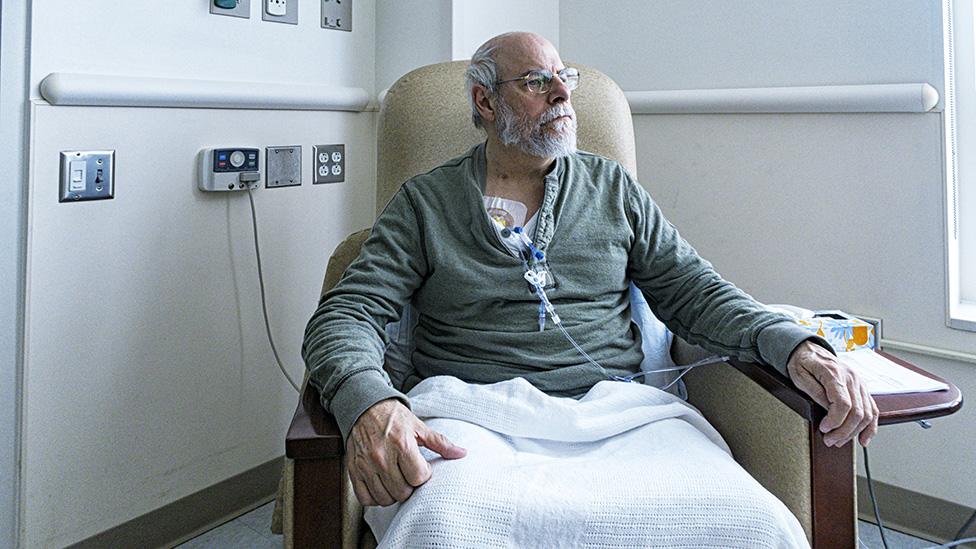Covid in Scotland: Easing restrictions 'puts vulnerable at risk'
- Published

Adults with weakened immune systems are less able to fight off infections naturally
Easing Covid restrictions while case rates remain high will put people with compromised immunity at risk, the Scottish government has been told.
In an open letter to Scottish ministers, a patient action group says any plan to "live with Covid" would have "significant ramifications".
Patients with impaired or weakened immune systems may not receive as much protection from vaccines.
The Scottish government said it would be offering advice to high-risk groups.
The 83 signatories to the letter, which include disabled people, those with pre-existing health conditions, unpaid carers and equality organisation representatives, say they want "clarity" from the Scottish government on its current strategy to tackle the Covid-19 pandemic.
The letter says the recent announcement by the UK Prime Minister Boris Johnson that the country had to "live with Covid" had left them "shaken", as it would put thousands of people at risk of becoming severely ill or dying from the virus.
"It has illustrated whose lives matter and who is dispensable," the letter said.
"Whilst these decisions apply to England, they will have direct and indirect consequences for Scotland, particularly during the holiday period."
The letter's authors go on to say that they were concerned about the "apparent change in narrative and the direction of public health decisions" in Scotland.
"All of this has significant ramifications for our society and economy. The inequality and invisibility already faced before Covid-19 by disabled people, those with pre-existing conditions and unpaid carers (the majority of whom are women) has been exacerbated," the letter adds.
"Any planned easing of restrictions must put the lives of those most at-risk first.
"Any policy decision to 'live with Covid' implies that the risk to our lives, and to the lives of our families, is a risk worth taking. We do not agree."

'Every trip is a massive risk'
Lynn Williams cares for her husband Derek, who has a severe spinal injury.
She told the BBC's Good Morning Scotland programme that "consistently high case rates" have caused the couple to start shielding again.
"I've also watched with some concern the increase in hospitalisations of those who are double vaccinated and we are both vaccinated so there are concerns around that.
"And I guess that as long as these case rates remain high, people like my husband and many who've signed the letter are at real risk really of catching Covid and dying."
Ms Williams is one of the signatories who signed the letter and said she's concerned by the "change in dialogue" from the Scottish government.
She said that living with Covid instead of suppressing the disease would have "profound implications" for people with compromised immunity.
She added: "I was due to go to the hairdressers today, that may sound like a simple thing for many but for me it's a break from caring and it's something for me.
"For my husband it means that every trip out is a massive risk so we have to risk assess every single thing that happens.
"He's due to go to hospital next week for some tests and that in itself just frankly terrifies me.
"So for us, it takes away choices to do things like go to the pub or go for a meal.
To be honest, these things are just too risky for us now."

People who take immunosuppressant drugs are often more vulnerable to catching infections.
And adults with weakened immune systems, or who are immuno-suppressed, are less able to fight off infections naturally.
They include people receiving chemotherapy or radical radiotherapy for cancer and those with serious immune disorders.
Recent studies suggest they do not receive as much protection from Covid vaccines as other people.
They are being encouraged to receive one of the Covid-19 vaccines but are also advised to continue to avoid exposure to the virus.
The letter asks the Scottish government whether it was still pursuing a "zero Covid strategy", and how it would respond to inequalities if there was now a plan to "live with Covid".

The daily total of Covid cases in Scotland surpassed 4,000 for the first time since mass testing began last week.
However, the rate of new cases does now appear to be slowing slightly.
A Scottish government spokesperson said: "We know that some people at highest risk may have heightened anxiety as restrictions ease and are mindful of this as we consider the next steps.
"The chief medical officer will be writing to everyone who is on the highest risk list soon with advice about what moving to level zero and beyond will mean for them.
"There remains a significant group of people at highest risk from Covid-19 who have not yet had both doses of the vaccine.
"We would encourage all those who are able to, to get vaccinated as soon as possible, though we understand there are some people whose health condition or age prevent them from doing do."

